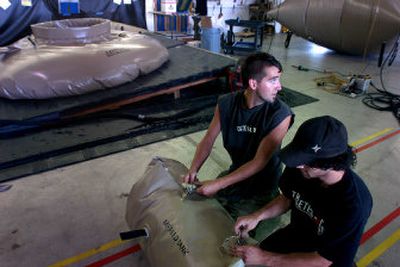Berg gets $17.5 million Army contract

A Spokane company whose history includes selling tents to the U.S. Army during the two world wars has seen the future, and it’s mostly made of high-quality vinyl and metal, not canvas.
Berg Companies, the rechristened version of what used to be F.O. Berg Co., recently landed a $17.5 million federal contract to provide 3,000-gallon water containment systems for the U.S. Army. Those containers, called onion tanks, are made of high-grade polyurethane.
The 75-employee company, with offices at 16124 E. Euclid in Spokane, has recast itself as a support-systems manufacturer, looking to sell “integrated remote-site systems” to government agencies, disaster-relief teams or big corporations needing portable shelters and water tanks.
The latest contract, with the Army’s Tank-Automotive and Armaments Command procurement group, means Berg’s Spokane workers will produce an initial batch of 345 plastic tanks – each about 6 feet in diameter and with protective top seals. Over the contract’s five years, Berg will produce more than 6,000 of the water tanks, said Berg Companies President Andy Barrett.
He said the growing global need for rapid deployment of people and material has opened the door for Berg to establish itself in a high-margin industry with growth years still to come.
“We also realized a while back the tent and canvas awning market was a limited one,” said Barrett. Last year he and co-owner Craig Dolsby sold their tent and awning operation to Bryce Ogle, who continues using the business name F.O. Berg. That company, founded in the 1880s, is considered one of the longest-surviving firms in Eastern Washington.
Last winter when earthquakes shook Pakistan’s rugged Kashmir region, a European manufacturer shipped a half-dozen specially constructed metal mini-hospital units to relief agencies.
About the size of a minivan, the metal units typically are built in modular forms that allow expansion once in place, creating a raised floor, doors, windows and, if needed, living space inside.
“They dropped them in by plane into six areas and then flew in a nurse and doctor team and were set up and running in 48 hours,” Barrett said. “There’s no reason why a company in the United States can’t make that same kind of structure.”
Berg’s history of making tents and awnings leaves the firm equipped to provide portable, lightweight structures made of high-quality fabric.
Berg Companies’ polyurethane and plastic fabrication unit started several years ago, a shift prompted by changes in the tent-making industry. Those makers realized nylon and other synthetics were needed to develop more durable tents.
Plus, Berg’s management saw a growing need for rapidly made plastic fuel and water containers. Those containers had to be collapsible, durable and resistant to mildew and ultraviolet rays.
A crucial factor in helping Berg land such contracts is the government’s key procurement criterion: Contracts can be awarded only to companies building products inside the United States and using only American-made components, said Barrett.
To acquire the ability to make remote-site, easily transported metal structures – for kitchen units, showers, weather-protected offices or medical facilities – Barrett and Dolsby became owners of 40 percent of Integrated Systems, a metal engineering and fabrication firm based in Plummer, Idaho. The majority owner in that company is the Coeur d’Alene Tribe. The net result, said Barrett, is that Berg can do it all, from tents to fuel and water tanks to solid-walled structures for any environment.
Barrett said the $17.5 million Army contract ($3.5 million each year for five years) is the largest single order yet for Berg.
The next tier of customers includes emergency response groups, state National Guard units, scientific teams needing remote site services, and larger corporations. One possible use, said Barrett, would be to help locate work teams in the remote section of Alberta’s oil sands development.
“I can just see the need for operations that can sustain a large number of workers in those locations,” said Barrett.
Jeff Guentzel, general manager of Bowhead, a Seattle-based manufacturer of polyurethane spill kits and plastic vessels, has used Berg Companies as a subcontractor on several large deals he’s landed with assorted agencies.
“They’re very responsive to what’s going on in the market,” he said.
Barrett said the $3.5 million contract this year with the Army will boost company revenue to an all-time yearly high of about $10 million. If growth continues, the company’s total work force could grow to 175 to 200, he added.